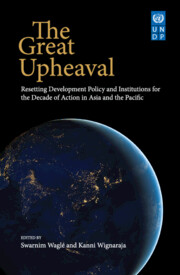Book contents
- Frontmatter
- Contents
- List of Figures
- List of Tables
- List of Boxes
- List of Appendices
- List of Abbreviations
- Foreword
- Acknowledgements
- Introduction
- 1 Aligning Sovereign Debt Financing with Climate Action in the Asia-Pacific Region
- 2 Melting Glaciers, Threatened Livelihoods: Confronting Climate Change to Save the Third Pole
- 3 Accelerating Universal Digital Connectivity
- 4 The Post-COVID-19 Future for Global Value Chains
- 5 Is Southeast Asia Falling into a Latin American–Style Middle-Income Trap?
- 6 Equality of Opportunity as a Measure of Development
- 7 Insights for Policymaking from the Multidimensional Poverty Index
- 8 COVID-19 and Human Security
- 9 Making COVID-19 Vaccine Universally Accessible
- 10 Enhancing the Provision of Global Public Goods: Ready for More Realism?
- 11 Asian-Pacific Regional Cooperation in the Post-COVID-19 Era
- 12 Pandemic Governance and Human Development: Early Lessons from Asia
- 13 Seven Lessons for Development Policy from the COVID-19 Pandemic
- About the Contributors
- Index
13 - Seven Lessons for Development Policy from the COVID-19 Pandemic
Published online by Cambridge University Press: 28 February 2022
- Frontmatter
- Contents
- List of Figures
- List of Tables
- List of Boxes
- List of Appendices
- List of Abbreviations
- Foreword
- Acknowledgements
- Introduction
- 1 Aligning Sovereign Debt Financing with Climate Action in the Asia-Pacific Region
- 2 Melting Glaciers, Threatened Livelihoods: Confronting Climate Change to Save the Third Pole
- 3 Accelerating Universal Digital Connectivity
- 4 The Post-COVID-19 Future for Global Value Chains
- 5 Is Southeast Asia Falling into a Latin American–Style Middle-Income Trap?
- 6 Equality of Opportunity as a Measure of Development
- 7 Insights for Policymaking from the Multidimensional Poverty Index
- 8 COVID-19 and Human Security
- 9 Making COVID-19 Vaccine Universally Accessible
- 10 Enhancing the Provision of Global Public Goods: Ready for More Realism?
- 11 Asian-Pacific Regional Cooperation in the Post-COVID-19 Era
- 12 Pandemic Governance and Human Development: Early Lessons from Asia
- 13 Seven Lessons for Development Policy from the COVID-19 Pandemic
- About the Contributors
- Index
Summary
INTRODUCTION
Does the experience of the COVID-19 pandemic provide lessons for furthering sustainable human development? Do any of these lessons derive from or apply in particular to the Asia-Pacific Region (APR)? Some initial reflections on these questions may now be possible, recognizing that, as Zhou Enlai is famously rumoured to have said about the French Revolution more than 150 years later, “it is too early to tell” (SCMP, n.d.). In this chapter, we make some observations about the national, regional and international responses during the crisis, critically evaluate these efforts, and identify institutional gaps and weaknesses that should be remedied to increase preparedness and improve responses to future pandemics and crises. We also use a lens borrowed from English art critic John Berger (1972) to focus on ‘ways of seeing’ policy rather than on identifying specific policy lessons.
LESSON 1: ACT STRATEGICALLY BY ACTING SPECIFICALLY
One of the most elementary but also consequential observations about the pandemic is that its effects have varied enormously across countries. This observation applies not only to how successfully countries have contained COVID-19 itself, but to how well they have avoided its damaging economic and social consequences. The measures governments have taken differ widely, as have the speed, effectiveness, and consequences of their implementation. The weight placed on distinct policy objectives, such as avoidance of COVID-19 deaths versus avoidance of economic contraction, has also varied across countries. Several countries have clearly done better in terms of some, perhaps all, major objectives, and this seems to be due to the specifics of their actions: not merely whether they took early, decisive or substantial action, but where and how they focused interventions. The best performing countries did better in terms of both health and economic outcomes and did not rely on untargeted, generalized lockdowns alone (Box 13.1). Of course, it is not possible to be certain that differences in outcomes have only to do with policies, since biological and epidemiological features, such as the strains of the virus affecting a country, would also have been relevant.
- Type
- Chapter
- Information
- The Great UpheavalResetting Development Policy and Institutions in the Asia-Pacific, pp. 360 - 386Publisher: Cambridge University PressPrint publication year: 2022

